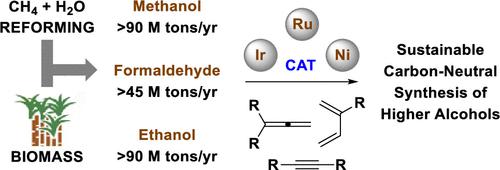当前位置:
X-MOL 学术
›
J. Org. Chem.
›
论文详情
Our official English website, www.x-mol.net, welcomes your
feedback! (Note: you will need to create a separate account there.)
Iridium-, Ruthenium-, and Nickel-Catalyzed C–C Couplings of Methanol, Formaldehyde, and Ethanol with π-Unsaturated Pronucleophiles via Hydrogen Transfer
The Journal of Organic Chemistry ( IF 3.3 ) Pub Date : 2022-11-30 , DOI: 10.1021/acs.joc.2c02356 Cole C Meyer 1 , Michael J Krische 1
The Journal of Organic Chemistry ( IF 3.3 ) Pub Date : 2022-11-30 , DOI: 10.1021/acs.joc.2c02356 Cole C Meyer 1 , Michael J Krische 1
Affiliation

|
In this Perspective, the use of methanol and ethanol as C1 and C2 feedstocks in metal-catalyzed C–C couplings to π-unsaturated pronucleophiles via hydrogen auto-transfer is surveyed. In these processes, alcohol oxidation to form an aldehyde electrophile is balanced by reduction of an π-unsaturated hydrocarbon to form a transient organometallic nucleophile. Mechanistically related reductive couplings of paraformaldehyde mediated by alcohol reductants or formic acid also are described. These processes encompass the first catalytic enantioselective C–C couplings of methanol and ethanol and, more broadly, illustrate how the native reducing ability of alcohols enable the departure from premetalated reagents in carbonyl addition.
中文翻译:

铱、钌和镍催化的甲醇、甲醛和乙醇与 π-不饱和亲核试剂通过氢转移发生 C-C 偶联
在本视角中,研究了使用甲醇和乙醇作为 C1 和 C2 原料,通过氢自动转移在金属催化的 C-C 偶联中与 π-不饱和亲核试剂发生偶联。在这些过程中,醇氧化形成醛亲电子试剂,通过还原π-不饱和烃形成瞬时有机金属亲核试剂来平衡。还描述了由醇还原剂或甲酸介导的多聚甲醛的机械相关还原偶联。这些过程涵盖了甲醇和乙醇的首次催化对映选择性 C-C 偶联,更广泛地说明了醇的天然还原能力如何能够在羰基加成中脱离预金属化试剂。
更新日期:2022-11-30
中文翻译:

铱、钌和镍催化的甲醇、甲醛和乙醇与 π-不饱和亲核试剂通过氢转移发生 C-C 偶联
在本视角中,研究了使用甲醇和乙醇作为 C1 和 C2 原料,通过氢自动转移在金属催化的 C-C 偶联中与 π-不饱和亲核试剂发生偶联。在这些过程中,醇氧化形成醛亲电子试剂,通过还原π-不饱和烃形成瞬时有机金属亲核试剂来平衡。还描述了由醇还原剂或甲酸介导的多聚甲醛的机械相关还原偶联。这些过程涵盖了甲醇和乙醇的首次催化对映选择性 C-C 偶联,更广泛地说明了醇的天然还原能力如何能够在羰基加成中脱离预金属化试剂。










































 京公网安备 11010802027423号
京公网安备 11010802027423号